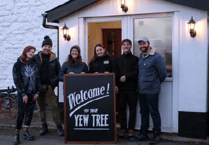A QUARTER of Forest children are living in poverty, according to shocking new figures – and the problem is even worse across the border in South Herefordshire.
The findings by the End Child Poverty Coalition come as the Forest Foodbank revealed that it gave out 1,634 emergency food parcels to local people – an increase of 27 per cent over the previous 12 months – and a third of them went to children.
The figures from the End Child Poverty Coalition are reported for Parliamentary constituencies and estimate that 5,000 children or 25.3 per cent are on the breadline in the Forest of Dean, 3,998, or 22.9 per cent in Monmouthshire and 6,772 or 29.7 per cent in South Herefordshire.
Forest Foodbank manager Robert Simpson said: “No one in the Forest of Dean should need a food bank’s help and we want to see an end to local people needing emergency food at all.
“It doesn’t have to be this way – our benefits system is supposed to protect us all from being swept into poverty.
“Universal Credit should be part of the solution, but currently the five-week wait is leaving many without enough money to cover the basics.
“This isn’t right.”
Sam Royston, director of policy at The Children’s Society, added: “The Children’s Society is hugely disappointed to see that across the South West around one in four children are trapped in poverty.
“Without significant additional investment, there is little hope of reducing child poverty rates in coming years.
“The government must invest more in children’s services urgently and reverse damaging decisions to cut benefit rates to ensure we can disrupt this continuing cycle of disadvantage.
“We need a renewed strategy to end child poverty in order to prevent another generation of young people growing up in a country where poverty harms their wellbeing and undermines their life chances.”
Figures used by End Child Poverty were based on families with children living on less than 60 per cent of the average national income – around £365 a week or £19,000 a year for a couple with one child under 14 and an additional £60.80 a week or £3,200 a year for each additional child under 14.
An additional £100 a week or £5,200 a year was allowed for each additional child over 14.
These levels of income are all after taxes, including cash benefits in 2017/18, plus money spent on housing.
Another measure – the ‘after housing costs’ poverty line – is based on £314 a week, or £16,400 a year, for a couple with one child under 14, and an additional £52 a week or £2,700 a year for each additional child under 14.
An additional £110 a week, or £5,700 a year, was allowed for each additional child over 14.
The new research was conducted by Professor Donald Hirsch and Dr Juliet Stone at the Centre for Research in Social Policy at Loughborough University.
Levels of child poverty were compiled using a wide range of indicators.
These were combined employing a statistical technique that is widely used in calculating local data, including by the Office for National Statistics and the World Bank.
To view the full report, visit www.endchildpoverty.org.uk
To find out more about the Forest Foodbank or to donate or volunteer, visit www.theforest.foodbank.org




